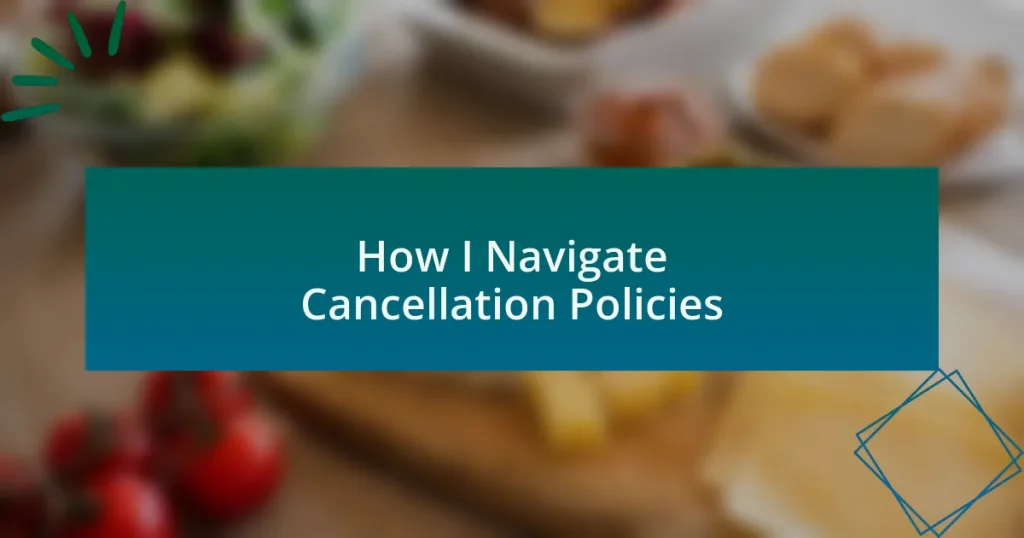Key takeaways:
- Understanding cancellation policies is crucial to avoid unexpected fees and enable better planning for dining experiences.
- Clear communication with restaurant staff about cancellation circumstances can lead to more accommodating solutions.
- Reading fine print and knowing key details about reservations can prevent unnecessary stress and financial burdens.
- Personal experiences highlight the importance of empathy and understanding in restaurant cancellation policies and interactions.
Author: Evelyn Harrington
Bio: Evelyn Harrington is an acclaimed author known for her evocative storytelling and intricate character development. With a background in literature and creative writing, she has published several best-selling novels that explore themes of resilience and identity. Her work has garnered numerous awards, including the prestigious Waverly Prize for Fiction. When she’s not writing, Evelyn enjoys hiking the scenic trails of her hometown and engaging with her readers through her popular blog. She currently resides in Portland, Oregon, where she continues to craft compelling narratives that resonate with audiences worldwide.
Understanding Cancellation Policies
When it comes to cancellation policies, grasping the specifics can feel overwhelming. I still remember a time when I booked a table for a special occasion and assumed I could cancel at any time. It turned out, I was charged a fee because I didn’t check the fine print, which left me feeling frustrated. Have you ever found yourself in a similar situation?
Cancellation policies often vary significantly; some offer flexible options, while others are strict. I’ve learned to always look for the window of time you can cancel without penalty. It’s more than just a matter of money—understanding these details can save you from a lot of stress and disappointment later on.
Have you ever felt the panic of needing to cancel at the last minute? I recall a situation when a sudden work commitment clashed with a planned dinner. Knowing the cancellation policy allowed me to inform the restaurant promptly, avoiding potentially steep fees. This experience highlighted why it’s crucial to digest these policies beforehand, as they are meant to protect both the restaurant and you.
Importance of Cancellation Policies
Cancellation policies are essential because they create a framework of expectations between diners and restaurants. I can recall a time when my friends and I made reservations for a highly sought-after weekend brunch. The cancellation policy allowed us to cancel up to 24 hours in advance without a fee, which provided peace of mind. It felt reassuring to know we could adjust our plans in case something came up—a common scenario we all face, right?
These policies also serve as a safety net for restaurants, helping them manage their resources efficiently. I experienced this firsthand when a popular local eatery had to turn away walk-ins on a night of no-shows. Many diners might overlook how these policies help restaurants minimize loss and maximize their service efficiency. It’s an ongoing exchange of respect and consideration.
Understanding cancellation policies fosters trust, laying the groundwork for positive experiences. I vividly remember dining at a restaurant where I had to cancel last minute due to illness. Knowing their lenient policy eased my guilt and allowed me to focus on recovery instead of worrying about a hefty fee. Isn’t it refreshing when businesses show empathy in their policies?
Overview of British Bistro Restaurants
British bistro restaurants blend traditional British cuisine with a cozy, casual atmosphere. I’ve often found that these establishments prioritize a warm, welcoming environment, encouraging diners to relax and savor their meals. The charm of a British bistro, in my experience, lies not only in the food but also in the way it brings people together, fostering a sense of community.
Many British bistros focus on seasonal ingredients, giving diners the chance to enjoy local produce in dishes like hearty shepherd’s pie or classic fish and chips. I remember the first time I tried a homemade sticky toffee pudding at a charming bistro; the combination of flavors and textures was so delightful that it made every bite a comforting experience. It’s this commitment to quality that keeps me returning, eager to explore their ever-evolving menus.
The ambiance of these bistros often mirrors their culinary focus—informal yet inviting. Picture this: you walk in, greeted by the enticing aroma of freshly baked scones, as soft melodies play in the background. It’s this balance that resonates with many, making British bistros a favorite for both casual outings and special gatherings. Have you ever stepped into a place that immediately felt like home? That’s the unmistakable magic of a great bistro.
Common Cancellation Scenarios
When navigating cancellation policies, one common scenario I’ve encountered is when a reservation falls on a holiday or special event. I remember calling to cancel a table for my birthday dinner; the restaurant had a strict policy that, unfortunately, meant I forfeited my deposit due to late notice. It made me realize how important it is to double-check the cancellation terms while planning special occasions.
Another frequent situation arises when unexpected changes in travel plans occur, such as a sudden illness or a work commitment. One time, I planned a lovely dinner with friends, but a last-minute work obligation forced me to cancel. The restaurant was understanding and allowed me to rebook without penalty, showing the importance of clear communication with the establishment regarding unforeseen circumstances.
Lastly, I’ve seen scenarios where customers simply forget about their reservations. I recall a time when I arrived at a bistro excited for a meal only to find my table had been given away due to a no-show policy. It highlighted for me that punctuality translates not just to respecting time but also to valuing the restaurant’s business. How often do we factor in those little details when making plans?
Steps to Navigate Policies
Understanding how to navigate cancellation policies is essential for a smooth dining experience. To start, I recommend thoroughly reading the policy, especially the conditions regarding deposits and penalties. I’ve personally rushed through this step before, only to be caught off guard by a hefty charge. When I took a moment to really digest the fine print, it made all the difference in my planning.
Next, I always advise reaching out for clarification if something isn’t clear. It’s surprising how often a simple phone call can alleviate concerns. I recall a time when I hesitated to cancel due to an emergency, but a quick chat with the bistro staff revealed they were more flexible than I expected. Don’t hesitate to ask questions; you might be pleasantly surprised by the accommodations they’re willing to offer.
Lastly, I find it helpful to set reminders for important dates related to my reservations. I once forgot to cancel a dinner and ended up receiving a charge I didn’t anticipate. Now, I set a calendar alert a day before each reservation, prompting me to reconsider my plans. Isn’t it interesting how a small action can save you both money and stress in the long run?
Tips for Effective Communication
When communicating about cancellation policies, clarity is key. I’ve found that being straightforward about your situation often leads to better outcomes. For instance, when I had to cancel due to a last-minute conflict, I made sure to explain my circumstances directly to the staff. They appreciated my honesty and worked with me to find a suitable solution.
It’s also crucial to match your tone with the nature of the conversation. If you’re feeling anxious about a potential fee, don’t hide it. Sharing your feelings can foster a more empathetic dialogue. I remember chatting with a manager who assured me that restaurants understand life’s unpredictability. That connection made me feel heard and humanized the entire conversation.
Lastly, keeping the communication line open after a cancellation can be beneficial. I often follow up with a thank you note or message. It’s a simple gesture, but it shows appreciation for their understanding. Have you ever noticed how a small act of kindness can leave a lasting impression? Engaging positively can create a relationship that may benefit future dealings.
Personal Experiences with Cancellations
When I think back to my own experiences with cancellations at restaurants, one stands out vividly. I had made a reservation for a special family dinner, only to face an unexpected situation that required me to cancel at the last moment. I remember feeling a rush of anxiety, fearing the possible financial hit from a cancellation fee. The staff was surprisingly understanding, which made me realize that honesty really does pave the way for compassion.
Another time, I hesitated to cancel a brunch reservation because I didn’t want to seem rude. After all, the restaurant had prepared for us. But when I finally made the call, I sheepishly shared my dilemma. To my relief, the representative reassured me, saying that cancellations happen all the time. This reinforced the idea that life is unpredictable, and it’s okay to put my needs first occasionally. Have you ever felt that burden of cancellation guilt? It’s liberating to know that at the end of the day, we’re all just trying to navigate our busy lives.
In one instance, I learned the hard way about the importance of reading the fine print. I cancelled within the policy’s time limit, but there was still a small fee I hadn’t anticipated. I remember calling to inquire about it and felt a mix of frustration and disappointment. However, during the conversation, I was pleasantly surprised at how the manager worked with me, eventually waiving the fee as a good will gesture. This experience taught me that while understanding policies is essential, human connection can often turn a rigid system into something far more accommodating.


